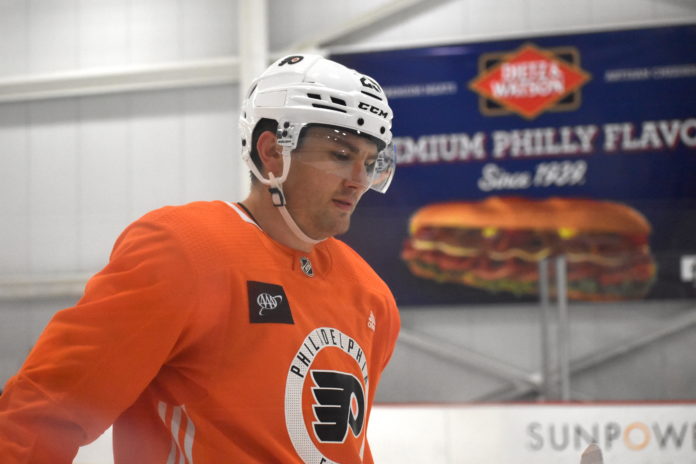The apparent fast-track rebuild is only months away, but the Flyers will need to be careful with their offseason moves.
Flyers General Manager Chuck Fletcher is rumored to be clearing cap space to attempt to bring in more talent, and many eyes have shifted to James van Riemsdyk and his $7 million contract as a target to clear room.
But the Flyers would be fools to do it.
Sure, getting JVR’s money off the books would certainly ease the pressure of the salary cap vice the Flyers have gotten themselves into, but trading van Riemsdyk’s contract is going to come at a cost. Absolutely no one is lining up to take on a $7 million cap hit for a guy who turns 33 in a few weeks and hasn’t had a 30-goal season since 2018, when he was a member of the Toronto Maple Leafs.
If you recall, the Flyers gave away a second-round and seventh-round pick to unload Shayne Gostisbehere’s contract to the Arizona Coyotes last year. Gostisbehere’s contract, which had two years remaining at a $4.5 million cap hit, was considered a negative asset by the Flyers.
JVR would likely cost even more to remove.
With one year left of JVR’s five-year contract, why not just bite the bullet and ride it out? On that note, let’s take a look at the options the Flyers have with van Riemsdyk’s contract this offseason.
Trade: As mentioned previously, it comes at a cost. The Flyers could retain half the salary ($3.5 million) to lower what they’d have to give up, but that makes little sense when you’re trying to unload a big number. Taking that out of the equation, the Flyers would have to give away assets to trade the contract. They’ve already traded their second-round picks in both 2022 (Gostisbehere) and 2023 (the Rasmus Ristolainen trade) so there’s not much value in draft picks until 2024 unless the Flyers are willing to foolishly include a first-round pick. The Flyers would likely have to include a few prospects for a team to consider a trade.
Buyout: It would help a little bit, but not too much. Because JVR’s contract had a slight dip toward the end and a $1 million signing bonus included this summer, he makes just $4 million of actual salary. The Flyers would buy out two-thirds of that $4 million over the next two years, meaning a savings of $2.7 million this year, with a $1.3 million hit added to next year’s cap. $2.7 million doesn’t go far when trying to land a big-fish free agent like Johnny Gaudreau.
Demote: JVR would need to pass through waivers if the Flyers wanted to send him down to the AHL. He would likely pass, as a team would have to take on his cap hit if they claimed him. But even if the Flyers wanted to send him to the Phantoms in favor of a younger player, most of his cap hit still remains on the books. It would be a lateral move in terms of money. and van Riemsdyk is a good player to have around a team of young players. He is well-liked and respected.
Keep: The Flyers don’t want to hear it, but they probably won’t be very good next year. With uncertainty around Ryan Ellis’ health, no cap room and no Claude Giroux, it’s tough to see this team making a major push. Sure, a new coach, a few minor pieces and better all-around play could elevate this roster to a bubble playoff team next season, but it would take a lot of things to go right just to eventually get bounced in the first round. Keep JVR, and look to trade him at the 2023 trade deadline. At that point, van Riemsdyk’s contract flips from negative to positive. At that point, the Flyers could eat half the salary and trade a perennial 20-goal scorer to a better-off team that has about $3 million of cap space and needs depth scoring for a playoff run. Van Riemsdyk could probably contribute to a team with a decent power play and he would be motivated with an expiring contract. Instead of giving away picks and prospects, the Flyers would instead be getting them in return. And even if the Flyers don’t find a deadline dance partner, the contract is off the books at the end of the season. Even Steven.
It’s the smartest move, but will it happen? The Flyers have made the playoffs just once in the last four years and that was in 2020 in a bubble in empty Canadian arenas, so technically, no Philadelphia fans have been to a postseason game since 2018, which means no playoff gate revenue. Players don’t get paid for playoffs so playoff revenue goes solely into ownership’s pockets.
Keeping in mind, the Flyers still owe former coach Alain Vigneault $10 million over the next two years and they pay Ilya Bryzgalov $1.6 million every year until 2027 not to play here, one would think there might be some financial motivation to get back into the playoffs at any cost — even if it’s mortgaging the future in terms of picks and prospects. ••





